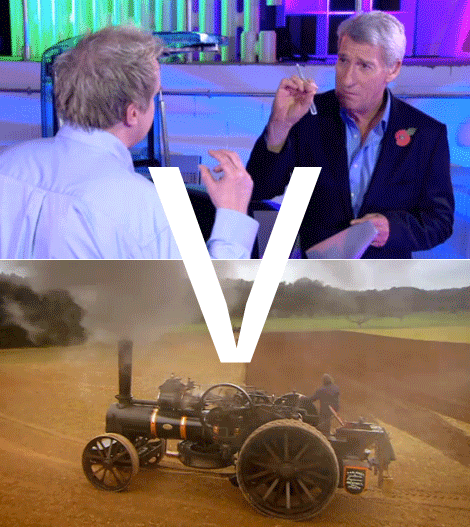
Paxman begrudgingly learns about 3D printing, while the Industrial Revolution stands up for itself
From my grubby bedsit somewhere in the depths of East London I’ve been absorbed by the amount of design and engineering on TV of late.
Last night I was compelled by Twitter chatter and some subtle press releases to switch my TV over to the BBC’s Newsnight: A current affairs programme compered by a fearsome host was to take a forthright look at 3D printing (not my usual viewing mix of repeats on Dave, Babestation, or the pub-sport gladiatorial bout that is darts).
It all got off to an excellently balanced start, with a brief explanation of processes and purposes of 3D printing, and how an industrial technology has become affordable to a domestic level, hence the sudden pick-up in interest. So far, so good.
There was nothing particularly new, but if you find yourself cheerleading industrial processes* as they make it into mainstream media then it must have been nice.
By far the highlight was host Jeremy Paxman’s hands-on introduction to the technology. A man used to tearing into politicians with gusto, and barracking businessmen until they cry, seemed genuinely perplexed by what was in front of him.
Step forward the owner of 3D printer supplier Tri-Tech, Paul Webber. His peroxide-blonde locks bristling in the bizarre green stage lighting. He was apparently only meant to drop off a machine to be featured on the show, yet instead appeared miked up and in front of camera, giving Paxman a concise, honest and well-worded explanation of what the fuss is all about.
I still don’t think his words sank in, but Paxo’s a busy man, and given another five minutes I’m sure he would have understood at least the industrial side of things.
However, what did gripe me was the question “Is 3D printing the new Industrial Revolution?” that was serially banded around the programme and the 3D Printshow from a few weeks back.
I’m not going to go into detail, wheel out books, arguments, and such, I’m simply going to direct you to another television programme: How Britain Worked.
Presented by a man with an accent so exquisitely Northern that he makes even my colloquially-inbred tones sound like a 1940s BBC radio announcer by comparison; Guy Martin has so far delved into a world of design and engineering that announced the advent of steam power and the mobile traction engine.
It was a compact, enthusiastic and brilliant explanation of how advancing technology had presented itself, adapted to need and forced a global change of such magnitude within such a short timescale that nothing would ever be the same again.
Technology took over the role of physical labour on a scale that is never going to repeat itself.
If for a second you believe that 3D printing is going to singlehandedly change entire industries and lead to wider social change where whole cities are formed, families transplanted, and a sole country take on global manufacturing significance as a result, then you’re wrong.
A shift is happening, but it’s so grindingly slow that it can be hard see it as a revolution that has uprooted the world from its previous ways.
If anything, combined with the internet, it should by design lead to the opposite of the Industrial Revolution we all know: to rescind our current urbanised lives and return to an evolved version of pre-industrial cottage industry, facilitated by remote working, data transfer and localised production.
In the future we should all be able to become country-bumpkins once more, hidden away wherever we choose, watching reruns of Top Gear.
*This is why sport exists
Recommended viewing:
You can watch the Newsnight clip here.
You can watch How Britain Worked here






